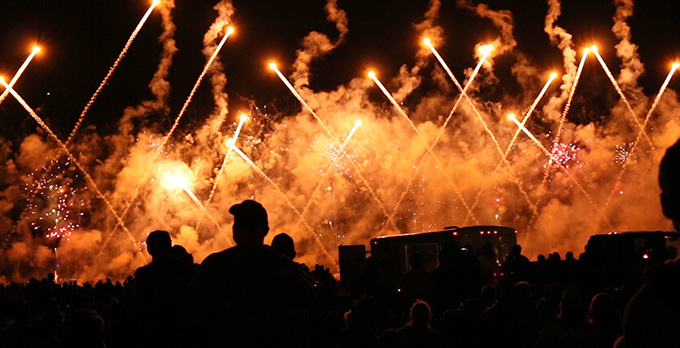Independence Day is synonymous with barbecues, parades and, of course, fireworks. But for emergency clinicians at The University of New Mexico Hospital and hospitals around the nation, the Fourth of July holiday is sadly also associated with a substantial increase in fireworks-related injuries and burns.
Every year, thousands of people are injured badly enough to require medical treatment after accidents involving fireworks, with many of the injuries happening to children and young adults. While most of these incidents are due to amateurs attempting to use professional-grade, homemade or other illegal fireworks or explosives, less powerful devices like small firecrackers and sparklers are also capable of causing significant injuries.
“The two weeks leading up to the Fourth of July and the two weeks afterwards, we see a lot of fireworks injuries,” said UNM Hospital trauma surgeon Richard Miskimins, MD. “This time of year is usually a lot busier in the trauma department. We brace ourselves.”
The two weeks leading up to the Fourth of July and the two weeks afterwards, we see a lot of fireworks injuries. This time of year is usually a lot busier in the trauma department. We brace ourselves
About 15,600 people in the U.S. were treated in hospital emergency departments for firework-related injuries in 2020, according to the Consumer Product Safety Commission (CPSP).Emergency department clinicians recommend leaving fireworks to the professionals. But there are some important safety considerations for anyone who decides to continue on their own celebrations.First and foremost, Miskimins said, if you or someone gets injured, immediately call an ambulance.
“If you see someone get injured, the first thing you should do is call 911,” he said. “Don’t worry as much as intervening for them, but make sure you’ve called someone who can help.”
Other tips include:
• Buy fireworks from a reputable seller and read all the warnings and safety instructions. Don’t light homemade fireworks.
• Keep a hose, bucket of water or a fire extinguisher nearby in case of a fire.
• Young children should never handle fireworks.
• Only light one at a time, then move away. Do not stand over an ignited firework.
• Never light fireworks in a container because they can explode, causing shrapnel to fly.
• Do not launch fireworks at anyone and avoid horseplay near flammable items.
• Avoid re-lighting or handling fireworks that malfunction.
• Do not use fireworks under the influence of alcohol or drugs. Nearly half (44%) of the firework-related deaths in 2020 involved impaired individuals, according to the CPSC.
“Almost all of the injuries that we see with fireworks are preventable injuries,” Miskimins said. “They range from really small burns from sparklers to bigger injuries from when people think their fireworks aren’t going to go off, they approach what they think is a ‘dud’, but the blasts are just delayed.”
Overall, though, Miskimins said he doesn’t want to prevent people from having fun during their holiday celebrations. He said he and his family light fireworks every year on Independence Day, making sure to follow safety precautions and implement common-sense rules for his children.
“I love fireworks and we do a lot of them on the Fourth of July. Fireworks are a lot of fun and I think they’re awesome to set off,” he said. “But I talk to my kids and tell them what not to do before we even get started.”
“Plan ahead, set the expectations in advance with your family on what’s safe and not safe, and stick to that,” he added. “Be safe and have fun.”
